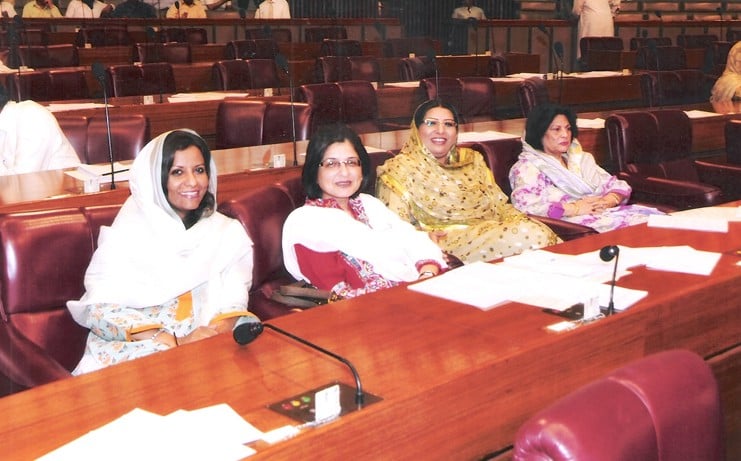
It’s time we explored the possibility of more active women participation within political parties

The status of women participation in politics is one of the many contradictions in Pakistan. On one hand we had Benazir Bhutto, the first female prime minister of the Muslim world and the chairperson of Pakistan Peoples’ Party, one of the largest political parties, at age 29, on the other, women are still not active in the decision-making processes.
Although women make up 20.29 per cent of the parliament in Pakistan, they are under-represented in federal and provincial cabinets: the federal cabinet has only two female state ministers. And, two provincial cabinets of Balochistan and Khyber-Pakhtunkhwa have absolutely no women representation.
According to data collected by Aurat Foundation and Fafen on the general elections of May 2013, only 419 out of over 6,800 candidates in national and provincial assemblies were women. Out of 419, only 259 women contested as independent candidates. Most of the mainstream parties awarded less than five per cent tickets to women in the 2013 elections.
"Women are considered second or third rate citizens among political parties, especially in the ruling PML-N," a senior woman parliamentarian of PML-N on condition of anonymity. "Women are more empowered in the PPP and ANP. It will take time for the PML-N to become more open to women."
She says her party has denied development funds to female members of the national assembly, as it is assumed among the leadership of the party that "women parliamentarians represent nobody. The more vocal women parliamentarians are not invited to meetings of the central working committee".
She says women are more loyal to their parties, "Very few women have shifted their party loyalties".
Perhaps with the exception of PPP and ANP, "upward mobility of women within political parties is rare," says Islamabad-based senior reporter Khawar Ghumman. "Reserved seats for women in parliament have become a source of political patronage. Their selection is based on the discretion of the party leadership. Most female parliamentarians are siblings or offsprings or close relatives of party leaders. Maryam Nawaz of PML-N, Faryal Talpur of PPP and Samia Raheel Qazi of JI are best examples."
Also read: The curious case of Dir
The PML-N, PPP and PTI have one female member each in the Senate selection board. All political parties, except the ANP, have a women’s wing. By and large, women’s wings lack any significant decision-making power, tend to tow the party line, have no autonomy and play a minimal role in policy-making or influencing party agendas.
"Women wings and reserved seats segregate women from the mainstream agenda of the political parties," says Bushra Gohar, elected Senior Vice President of ANP. "Women should be elected through direct elections even on reserved seats."
She adds that the ANP has amended its constitution to increase the representation of women in decision-making bodies -- "In KP, we have five regions and one female vice president and joint secretary is elected from all regions through elections.".
According to her, culture/traditions and religion are used as two main excuses to exclude women from participation in politics. "Some elements in the ANP oppose this move, saying the party will be unable to find women candidates from Fata. But, during the party elections, our vice president of Kurram Agency in Fata got more votes than her male counterparts."
Bushra Gohar says politics is considered an all male domain. "Male leadership of parties treat women as intruders. The PML-N has never provided space to women. The PPP has always been a women-friendly political party among major parties in Pakistan. It has several women in decision-making positions. The PTI, on the other hand, talks about change but has failed to induct a single woman in its provincial cabinet in KP."
The organisations working on the empowerment of women in the political process of the country say that political parties need to take affirmative action backed by legislation to mainstream women in political agenda influencing process. "Representation of women in the present parliament is less than the previous government. A bill to amend Political Parties Order 2002 is pending in the National Assembly. The bill proposes that every political party should select a minimum of 10 per cent women candidates for elective officers for general seats," says Rabia Hadi of Aurat Foundation, an NGO working for women empowerment.
She says women’s effective political participation in political parties is critical not only in terms of contributing significantly towards improving their status, but also in ensuring that women’s views and concerns are reflected in all public policy. "This would not be achieved only through reserved seats and women wings, but through participation in reality. The political parties need to realise that women are a political constituency and their concerns need to be addressed and fought for, not only in parliament but also in the party ranks."
Nafisa Shah who tabled the bill in the National Assembly says it was proposed during a meeting of women parliamentarians of all parties during the last tenure that 10 per cent tickets on general seats would be awarded to women. "This bill should have been adopted and passed. It lapsed during the last government as we filed it late. Now, it depends on this government. The standing committee unanimously adopted the bill in November 2014 but government has not brought it to the house floor," she says.
She thinks a denial of development funds to women parliamentarians is constitutional discrimination -- "It is true that the PPP has more women in decision-making bodies, including central executive committee, but we believe the party still has to do a lot to mainstream women in the party."